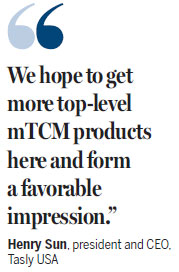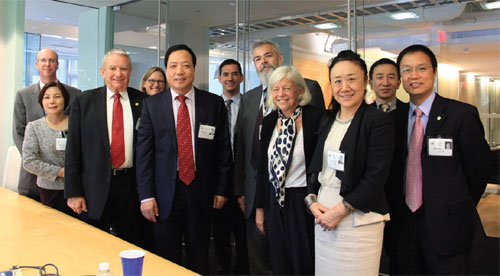Getting TCM accepted in US
Tasly execs say sales of $10 million must be reached by year end
On the website of Chinese biopharmaceutical giant Tasly Group Holdings, a graphic shows what is at the heart of all its products: Modernized Traditional Chinese Medicine (mTCM).
And to Henry Sun, president and CEO of Tasly's US subsidiary Tasly Pharmaceuticals, Inc, the company needs to achieve $5 million to $10 million in sales by the end of this year to be able to say, "We have 'come into' the US and have been recognized by American families".
Tasly Group was founded in China in 1994. Its US subsidiary was established in 2006 and will be Tasly's overseas headquarter, said Chairman Yan Xijun, at a ribbon cutting ceremony last year.
In 2011, Tasly purchased its new building in Rockville, Maryland, minutes from the National Institute of Health (NIH) and many other medical research centers and pharmaceutical companies.
The company's 19 employees, mostly American, are grouped into the R&D team, the marketing and sales team, business development, and the general management team.
The R&D team has good relations with NIH, the Johns Hopkins, as well as the Bravewell Collective Network focus on integrative medicine include 16 well-known academia and medical centers, such as Duke University, Boston Medical Center, and UCSF, according to CEO He (Henry) Sun. "These universities all have an integrated medicine center, and they have shown growing interest in TCM as well. We cooperate with them to study our products," Sun said.
Tasly's products and services cover TCM, pharmaceuticals and biologic drugs, nutraceuticals, healthcare products, and medical rehabilitation and health managements.
"The Tasly Group has always aimed for comprehensive internationalization and bring our well-evidenced mTCM products to benefit the American patients, and we think there are three steps in making it happen," said Sun, who had been a Food and Drug Administration regulatory Expert Reviewer since 1993 before joining Tasly Group in 2006.
He said the first step, "step out" is to establishing Tasly's place in the US is to get its drug products pass FDA approval process and then into the US market for patients, for example.
The second step, "step in" is to blend into mainstream healthcare system in the US, and use mTCM in cooperation with Western medicine (integrative medicine), to treat diseases that are difficult to handle.
The final step, "step up" which Sun acknowledged may be far down the road, is to make mTCM a first choice for some diseases that Western medicine cannot treat completely or lack of treatment options.
"We're still at the first stage. We have successfully sold some evidence based, clinical proven dietary supplements to the US Army, pharmacy chain stores, and nutrition stores in the US, and that is a good start," Sun said.
Apart from following their plans of internationalization, Sun said Tasly also has worked with other Chinese pharmaceutical companies to help get their products overseas.

"If in the next five or 10 years Tasly's products are still the only ones recognized in the US, there still were not be much recognition of TCM among US households," Sun said in explaining the company's incentive for helping potential competition.
"We hope to get more top-level mTCM products here and form a favorable impression. That way people think about Chinese medicine the way they think about German cars, or Japanese products," he said.
Sun said Chairman Yan in China holding group agrees with him and supports his goal to create a win-win choice for Chinese pharmaceutical firms.
In 2015 Tasly also managed to get their products on Amazon. Sun believes that is a notable achievement because through Amazon Tasly product will reach worldwide customers with good recognition.
"Another one of Tasly's achievements in the past two years is that we made a crucial decision on positioning," said Sun. Instead of talking about "modernizing Chinese medicine", which gives the impression that TCM is ancient and out of date, they decided to position it as "To modernize medicine, naturally".
Sun believes that the development of chemical pharmaceuticals have reached a bottleneck, as lead compounds, new structures and disease targets have been explored extensively.
"But in a way mTCM is all natural, and it provides a new, significant resource for the discovery and development of pharmaceuticals," he said.
Liu Jingyang contributed to this story.
|
Tommy Thompson (third from left), former secretary of Health and Human Services; Yan Xijun (fifth from left), chairman of Tasly Holding Group Co; Wu Naifeng (third from right), president of Tasly Holding Group Co; and Henry H. Sun (right), vice-president of Tasly Holding Group Co, at Cleveland Clinic in September 2014. Provided to China Daily |
(China Daily USA 08/19/2015 page2)



















